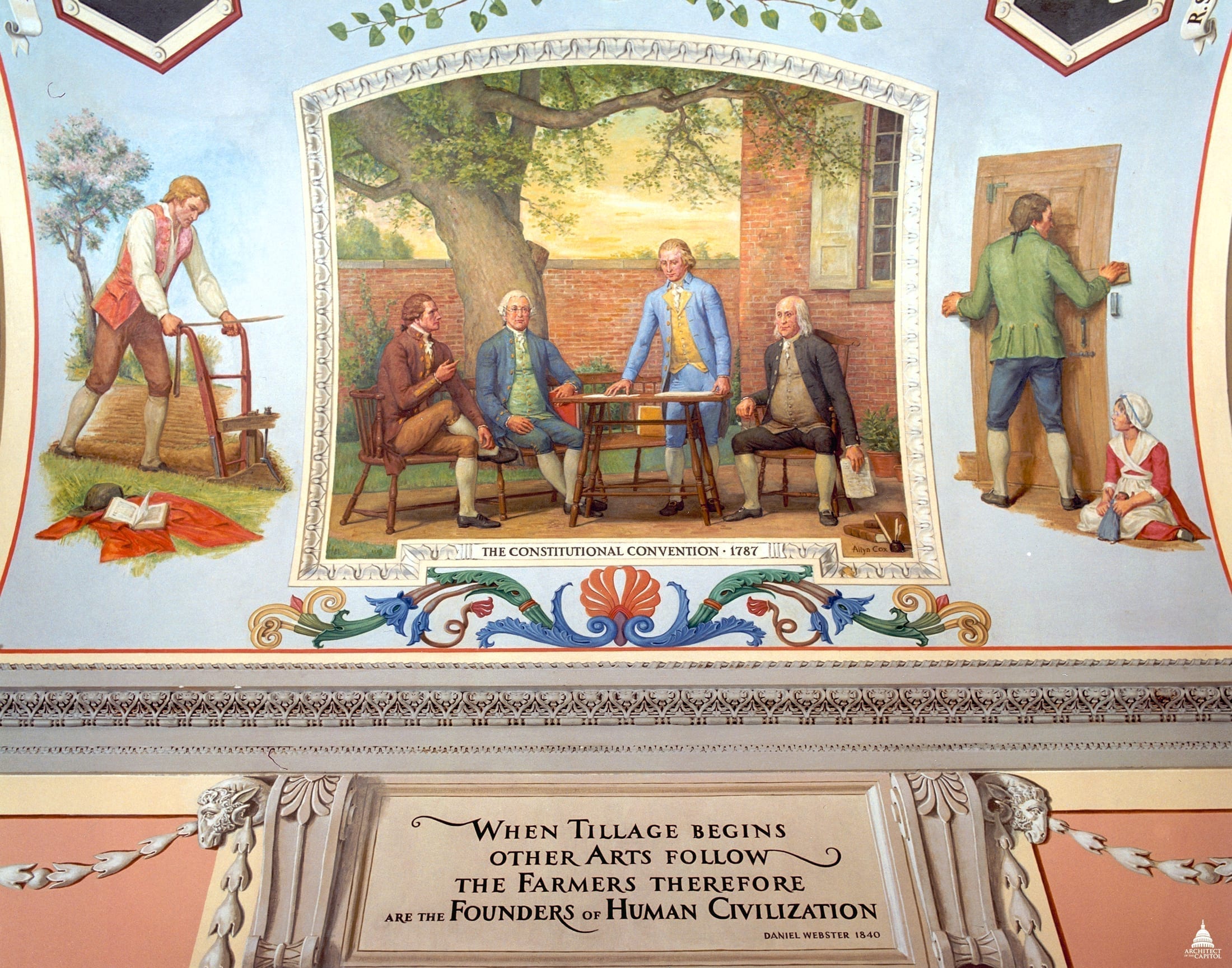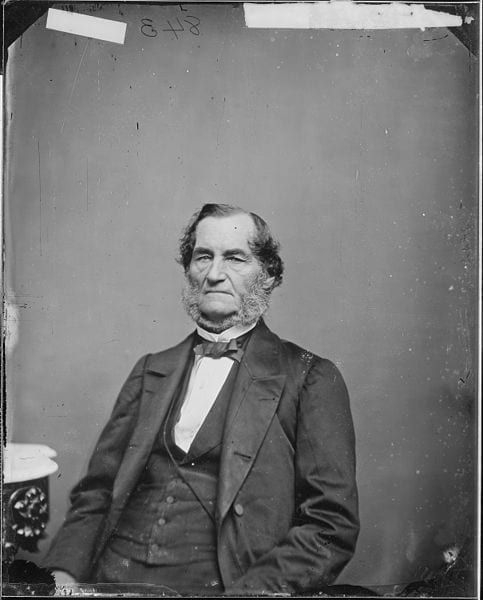
“From James Madison to Thomas Jefferson, 4 February 1790,” Founders Online, National Archives, https://teachingamericanhistory.org/7o1p.
Dear Sir,—Your favor of the 9th. of Jany. inclosing one of Sepr. last did not get to hand till a few days ago. The idea which the latter evolves is a great one, and suggests many interesting reflections to legislators, particularly when contracting and providing for public debts. Whether it can be received in the extent your reasonings carry it is a question which I ought to turn more in my thoughts than I have yet been able to do, before I should be justified in making up a full opinion on it. My first thoughts though coinciding with many of yours, lead me to view the doctrine as not in all respects compatible with the course of human affairs. I will endeavor to sketch the grounds of my skepticism. "As the earth belongs to the living, not to the dead, a living generation can bind itself only; in every society, the will of the majority binds the whole: According to the laws of mortality, a majority of those ripe at any moment for the exercise of their will do not live beyond nineteen years: To that term then is limited the validity of very act of the Society: Nor within that limitation, can any declaration of the public will be valid which is not express."
This I understand to be the outline of the argument.
The Acts of a political Society may be divided into three classes.
1. The fundamental Constitution of the Government.
2. Laws involving stipulations which render them irrevocable at the will of the Legislature
3. Laws involving no such irrevocable quality.
However applicable in Theory the doctrine may be to a Constitution, in [sic] seems liable in practice to some very powerful objections. Would not a Government so often revised become too mutable to retain those prejudices in its favor which antiquity inspires, and which are perhaps a salutary aid to the most rational Government in the most enlightened age? Would not such a periodical revision engender pernicious factions that might not otherwise come into existence? Would not, in fine, a Government depending for its existence beyond a fixed date, on some positive and authentic intervention of the Society itself, be too subject to the casualty and consequences of an actual interregnum?
In the 2d. class, exceptions at least to the doctrine seem to be requisite both in Theory and practice.
If the earth be the gift of nature to the living their title can extend to the earth in its natural State only. The improvements made by the dead form a charge against the living who take the benefit of them. This charge can no otherwise be satisfyed than by executing the will of the dead accompanying the improvements.
Debts may be incurred for purposes which interest the unborn, as well as the living: such are debts for repelling a conquest, the evils of which descend through many generations. Debts may even be incurred principally for the benefit of posterity: such perhaps is the present debt of the U. States, which far exceeds any burdens which the present generation could well apprehend for itself. The term of 19 years might not be sufficient for discharging the debts in either of these cases.
There seems then to be a foundation in the nature of things, in the relation which one generation bears to another, for the descent of obligations from one to another. Equity requires it. Mutual good is promoted by it. All that is indispensable in adjusting the account between the dead & the living is to see that the debits against the latter do not exceed the advances made by the former. Few of the incumbrances entailed on Nations would bear a liquidation even on this principle.
The objections to the doctrine as applied to the 3d. class of acts may perhaps be merely practical. But in that view they appear to be of great force.
Unless such laws should be kept in force by new acts regularly anticipating the end of the term, all the rights depending on positive laws, that is, most of the rights of property would become absolutely defunct; and the most violent struggles be generated between those interested in reviving and those interested in new-modelling the former State of property. Nor would events of this kind be improbable. The obstacles to the passage of laws which render a power to repeal inferior to an opportunity of rejecting, as a security agst. oppression, would here render an opportunity of rejecting, an insecure provision agst. anarchy. Add, that the possibility of an event so hazardous to the rights of property could not fail to depreciate its value; that the approach of the crisis would increase this effect; that the frequent return of periods superseding all the obligations depending on antecedent laws & usages, must by weak[en]ing the reverence for those obligations, co-operate with motives to licentiousness already too powerful; and that the uncertainty incident to such a state of things would on one side discourage the steady exertions of industry produced by permanent laws, and on the other, give a disproportionate advantage to the more, over the less, sagacious and interprizing part of the Society.
I find no relief from these consequences, but in the received doctrine that a tacit assent may be given to established Constitutions and laws, and that this assent may be inferred, where no positive dissent appears. It seems less impracticable to remedy, by wise plans of Government, the dangerous operation of this doctrine, than to find a remedy for the difficulties inseparable from the other.
May it not be questioned whether it be possible to exclude wholly the idea of tacit assent, without subverting the foundation of civil Society? On what principle does the voice of the majority bind the minority? It does not result I conceive from the law of nature, but from compact founded on conveniency. A greater proportion might be required by the fundamental constitution of a Society, if it were judged eligible. Prior then to the establishment of this principle, unanimity was necessary; and strict Theory at all times presupposses the assent of every member to the establishment of the rule itself. If this assent can not be given tacitly, or be not implied where no positive evidence forbids, persons born in Society would not on attaining ripe age be bound by acts of the Majority; and either a unanimous repetition of every law would be necessary on the accession of new members, or an express assent must be obtained from these to the rule by which the voice of the Majority is made the voice of the whole.
If the observations I have hazarded be not misapplied, it follows that a limitation of the validity of national acts to the computed life of a nation, is in some instances not required by Theory, and in others cannot be accomodated to practice. The observations are not meant however to impeach either the utility of the principle in some particular cases; or the general importance of it in the eye of the philosophical Legislator. On the contrary it would give me singular pleasure to see it first announced in the proceedings of the U. States, and always kept in their view, as a salutary curb on the living generation from imposing unjust or unnecessary burdens on their successors. But this is a pleasure which I have little hope of enjoying. The spirit of philosophical legislation has never reached some parts of the Union, and is by no means the fashion here, either within or without Congress. The evils suffered & feared from weakness in Government, and licentiousness in the people, have turned the attention more towards the means of strengthening the former, than of narrowing its extent in the minds of the latter. Besides this, it is so much easier to espy the little difficulties immediately incident to every great plan, than to comprehend its general and remote benefits, that our hemisphere must be still more enlightened before many of the sublime truths which are seen thro’ the medium of Philosophy, become visible to the naked eye of the ordinary Politician.

Conversation-based seminars for collegial PD, one-day and multi-day seminars, graduate credit seminars (MA degree), online and in-person.









































































































































